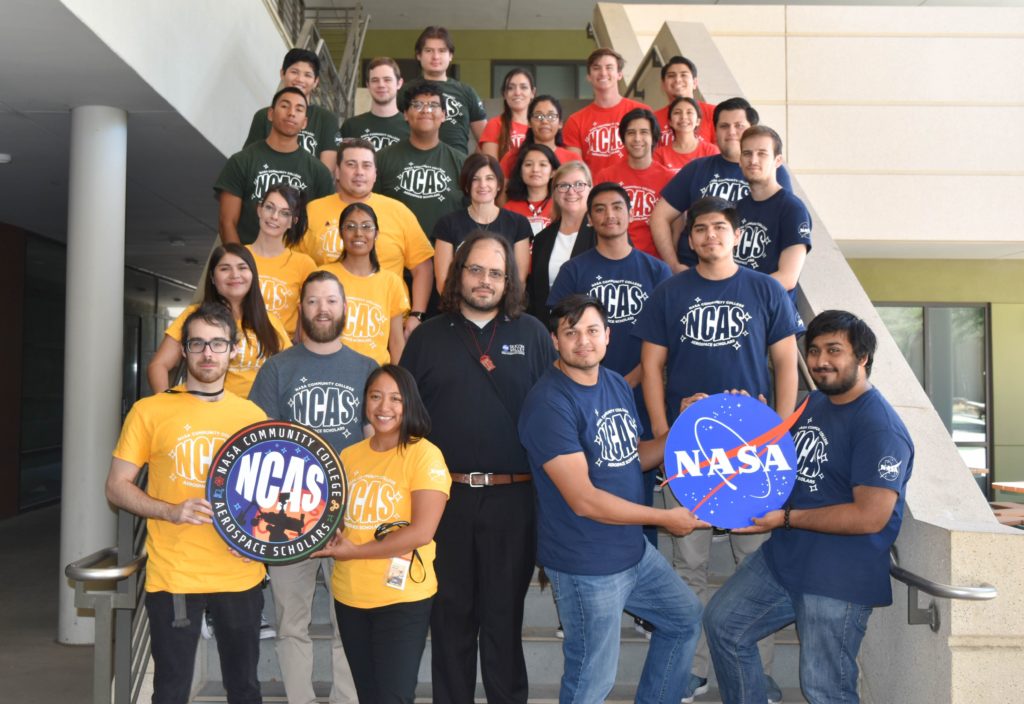How to engage students? Rocket science!
A collaboration between NASA and College of the Desert (COD) has successfully launched, thanks to Jorge Perez, assistant professor in math.
In March, the NASA Community College Aerospace Scholars
(NCAS) program selected COD to participate in a pilot project called NASA On
Campus. It is one of six community colleges serving minority students in the
project, funded by NASA’s Minority University Research and Education
Project (MUREP).
“I felt proud to be one of the six,” says Perez, who
facilitated the collaboration. “It’s important for students to see NASA present
on campus so they can envision themselves there in the future. NASA’s presence
gave them the confidence to believe in themselves.”
(The other participating colleges are Cerritos College in
Norwalk, two colleges in Mississippi, one in New Jersey, and one in Oklahoma.)
NCAS offers community college students focusing on STEM
careers a weeklong experience at NASA centers. Nearly 200 internships have been
awarded to students since 2007, helping students obtain jobs in the aerospace
industry. The travel may be difficult for some students — especially minority
students — so NASA On Campus was created last summer to help level the playing
field.
For NASA On Campus, 24 COD students first took a five-week
online course, administered and funded by NASA. Perez was the instructional
assistant for the self-paced class, answering students’ questions. Those who
passed participated in NASA-created engineering design and robotics
competitions on campus. NASA sent representatives for the weeklong
competitions, and will award a student from each of the six campuses a NASA
summer internship.

“Student groups competed for a mock NASA contract,” says Perez. “The focus was to design, develop and construct a functioning rover to perform tasks. During this time students learned team-building skills, listened to NASA speakers, and worked with mentors from local industries who were COD alums.”
Our 2019-2020 Innovation Issue
Jorge Perez is one of the innovative educators we highlight this year. Meet the rest:
- Jennifer Barry guides Special Ed students in work and life skills
- Sherinda Bryant teaches English through a social justice lens
- James Gensaw helps Native American youth connect to their culture
- Somphane Hunter creates community in the kitchen
- Daniel & Dennis Gibbs set a STEM career path for students
- Becky McKinney builds relationships; students learn NGSS along the way
- Juan Padilla‘s big idea brings science opportunity to all kids
To prepare for the pilot project, Perez received online
training and visited NASA Ames Research Center in Silicon Valley. Then he was
invited to help run the NCAS program at Langley Research Center in Virginia,
which he found “extremely useful” in deciding what would work (and not work) at
a community college.
COD has been part of the California Space Grant Consortium
since 2015, with Perez as lead. The consortium is the state’s implementation
arm of NASA’s National Space Grant College and Fellowship Program, supporting
scholarships, fellowships and traineeships for aerospace-related education,
plus faculty training. It nominated COD, which has a Hispanic enrollment of
nearly 70 percent, to participate in NASA On Campus.
Creating an oasis of scientific excellence at COD did not
happen overnight. Since 2015, staff have been mentoring students to program
microcontrollers. Students presented their projects at Armstrong Flight
Research Center and USC School of Engineering.
“Every year students did better, developing more complex projects,
ranging from low-cost incubators to 3-D printers and satellite prototypes,”
says Perez. “They even created a car that could be moved literally with
thoughts. I know this sounds crazy, but it worked. Our students’ achievements
led to a recommendation for the NASA pilot project. It’s an amazing success
story.”
Perez, an adjunct professor since 2011 and a College of the Desert Faculty Association member, is a success story himself. Born in Mexico, he moved to America at 12 without being able to speak a word of English. He received his associate degree in math and philosophy from COD and transferred to UC Riverside, where he received his bachelor’s and master’s in pure mathematics.
His high school science teacher cooked breakfast for him on
a Bunsen burner and paid for his AP chemistry exam because his parents couldn’t
afford it. Her kindness motivated him to become a teacher so he could help
others.
Perez’s students are grateful for the opportunity to reach
for the stars.
“It’s one of the greatest experiences I’ve ever had in my life,” one student wrote on a survey after the project. “This program gives you all the information you need to succeed in a STEM career.”
The Discussion 0 comments Post a Comment